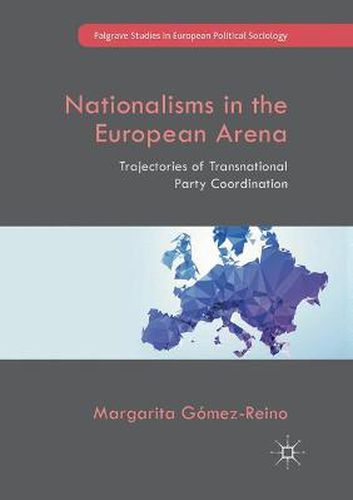Readings Newsletter
Become a Readings Member to make your shopping experience even easier.
Sign in or sign up for free!
You’re not far away from qualifying for FREE standard shipping within Australia
You’ve qualified for FREE standard shipping within Australia
The cart is loading…






This title is printed to order. This book may have been self-published. If so, we cannot guarantee the quality of the content. In the main most books will have gone through the editing process however some may not. We therefore suggest that you be aware of this before ordering this book. If in doubt check either the author or publisher’s details as we are unable to accept any returns unless they are faulty. Please contact us if you have any questions.
This book explores how the multiplicity of nationalist parties across the European Union have embraced or refused the process of European integration and made it a platform for transnational coordination in the European arena. The author analyzes how opposing pro-European minority nationalist parties and Eurosceptic populist nationalist parties have diversely politicized European integration over the past three decades and engage in different patterns of Europeanization. Tracing their divergent trajectories of transnational coordination, the book examines the common challenges these opposing nationalist party families face and their systematic fragmentation in the European arena. The book offers a novel approach to understanding the conditions for the emergence of truly European nationalist party families, based on the interaction of ideological, strategic and institutional variables that underpin the Europeanization of heterogeneous nationalisms.
Nationalisms in the European Arena will be of interest to students and scholars across a range of disciplines including sociology and political science. It contributes to the increasing literature on identity politics in the European Union and reveals the mechanisms behind why the European arena is adverse to the political translation and organization of domestic nationalisms as distinctive European actors.
$9.00 standard shipping within Australia
FREE standard shipping within Australia for orders over $100.00
Express & International shipping calculated at checkout
This title is printed to order. This book may have been self-published. If so, we cannot guarantee the quality of the content. In the main most books will have gone through the editing process however some may not. We therefore suggest that you be aware of this before ordering this book. If in doubt check either the author or publisher’s details as we are unable to accept any returns unless they are faulty. Please contact us if you have any questions.
This book explores how the multiplicity of nationalist parties across the European Union have embraced or refused the process of European integration and made it a platform for transnational coordination in the European arena. The author analyzes how opposing pro-European minority nationalist parties and Eurosceptic populist nationalist parties have diversely politicized European integration over the past three decades and engage in different patterns of Europeanization. Tracing their divergent trajectories of transnational coordination, the book examines the common challenges these opposing nationalist party families face and their systematic fragmentation in the European arena. The book offers a novel approach to understanding the conditions for the emergence of truly European nationalist party families, based on the interaction of ideological, strategic and institutional variables that underpin the Europeanization of heterogeneous nationalisms.
Nationalisms in the European Arena will be of interest to students and scholars across a range of disciplines including sociology and political science. It contributes to the increasing literature on identity politics in the European Union and reveals the mechanisms behind why the European arena is adverse to the political translation and organization of domestic nationalisms as distinctive European actors.